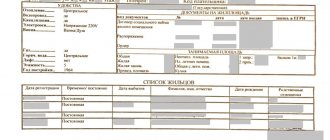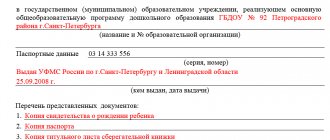Is it possible to deregister?
It is possible to remove a child from registration. Especially when it comes to adult children. Parents of a grown son or daughter have the right not to provide registration in their home. And if an adult child does not live at his place of registration, then it is easy to remove him from registration. It is advisable to do this peacefully, but if the son or daughter refuses to go through the discharge procedure, everything can be done through the court.
Minor
If necessary, they can also be issued if certain conditions are met, but this is done only in court. During the investigation, it becomes clear where the small citizen lives, who is related to the owner of the apartment, how and under what circumstances he was registered in this area, etc. If there are no reasons to prevent this, the discharge of minors is carried out without any difficulties.
The following circumstances should be taken into account:
- The little citizen will not be discharged from the apartment unless registration is planned in another place. It is also necessary that the new place of registration is not worse than the previous one; the minor must receive the same number of meters for living or more.
- If the child is one of the owners of the apartment, then the discharge procedure is carried out only with permission from the guardianship and trusteeship authorities.
- The offspring can be discharged from the apartment only together with one of the parents. If the father and mother remain registered in the same place, then their son or daughter will remain with them, and according to the law it will not be possible to discharge them.
Since deregistration affects the rights of the child, the court will begin to comprehensively study the case.
Without the child's consent
Until a small citizen has reached the age of 10 years, his consent to discharge and registration is not required. In the future, he must confirm that he does not object to this procedure. This applies to cases where a minor is registered in the parents’ apartment. His father and mother cannot deregister him without his consent.
If the parents are divorced, and the offspring lives with the mother, but is registered in the father’s living space, then the possibility of discharge exists. To do this, it is necessary to prove in court that he does not live at his place of registration. If the father pays child support, the court will make a positive decision on the claim.
Special cases
How to discharge a disabled person from an apartment if he is not the owner?
In most cases, the court will not side with the plaintiff if he is trying to evict a citizen who has 1 or 2 degrees of disability .
These categories of citizens are protected by Government Order dated February 26, 1994. In such situations, there will be absolutely no difference whether he is the owner of the residential premises or just a tenant.
If an incapacitated citizen has minor children, you should also not wait for a positive decision in your favor. Cases in which a person with disabilities participated in the acquisition of living space .
In all of the above situations, only irrefutable evidence showing the danger of other persons living in the same territory together with a citizen incapacitated due to illness can help win the case.
Regardless of the reason for going to court, you should prepare for the fact that the process will be complex and lengthy. To be more confident in the success of the case, it will be useful to contact an experienced lawyer and lawyer to conduct the trial.
Didn't find the answer to your question? Find out how to solve exactly your problem - call right now:
Is it possible to discharge a minor without the consent of the mother?
During a divorce, the question sometimes arises of how to remove a child from the father’s apartment without the mother’s consent. This is possible under the following circumstances:
- The father pays child support for his offspring. In fact, they are not members of his family, so they can be discharged from his living space. Especially if the child’s place of residence is the mother’s home.
- The mother has been deprived of parental rights. In this case, she cannot prevent the father or guardian of the son (daughter) from changing the place of registration. The court may interfere with this if the change of place of registration entails a deterioration in living conditions.
There are also cases when the minor is not closely related to the owner of the apartment or is not a relative at all. This happens when parents turn to a distant relative with a request to register a child, or when buying housing with an encumbrance. Then, to remove minors from registration, you must go to court.
What does the owner of the share actually own?
Owning a share of an apartment most often does not mean owning the rights to a specific room (even if it is possible to allocate a room to each owner). The owner owns a share in the property right, and it can be equal to the shares of other owners, or greater or lesser.
“Shared ownership is a special form of ownership in which none of the co-owners has a specifically allocated property; in every centimeter of the apartment there is a share of the other owner,” explains Irina Berbeneva, head of the “In Krylatskoye” office. - Therefore, sometimes it is very difficult to establish the order of use. If the co-owners cannot agree peacefully, then they determine the procedure for use in court.”
However, the share may be real. According to the chairman of the board of directors, Irina Dobrokhotova, the real share can be tied to specific parts of the apartment (for example, a room of 12 sq. m in a two-room apartment with a total area of 52 sq. m). Moreover, only an isolated living space - a room - can be allocated, while the corridor, kitchen and bathroom remain in common shared ownership. The allocation of real shares leads to the fact that the apartment actually turns into a communal one.
Conditions of discharge
To discharge a minor, the following conditions must be met:
- Availability of registration space. At the same time, the new living space should not be worse than the previous one.
- Planned registration of the child at the place of registration of one of the parents.
- Consent of the minor (if he is 10 years old).
- Consent of guardianship authorities. It is required if the minor is one of the owners of the housing from which he is planned to be removed.
- The consent of both parents is desirable. If this condition is not met, the father or mother may contact the guardianship authorities with a complaint.
You can find out whether it is possible to remove a minor from registration from a lawyer. Each situation is individual and all circumstances must be assessed.
How to discharge a child from your apartment through the court?
To forcefully discharge a minor, you will need:
- Submit a claim.
- Pay a state fee of 300 rubles. (Article 333.19 of the Tax Code of the Russian Federation).
- Confirm with documents or testimony all the circumstances of the case.
- Participate in court hearings.
- Obtain a decision from an official.
- Submit documents to the registration authority.
When considering a case in court, representatives of the guardianship and trusteeship authorities are involved. If one of the participants in the process does not agree with the decision, he can appeal it within the prescribed period.
sample claim
The statement of claim is drawn up in accordance with the requirements of Art. 131 Code of Civil Procedure of the Russian Federation.
It should contain the following information:
- name of the court department;
- information about the plaintiff and defendant;
- circumstances of the case;
- evidence of violation of citizen's rights;
- plaintiff's claims;
- list of applications;
- date and signature.
List of documents
The following documents are attached to the claim.
| No. | Name |
| 1 | Passport |
| 2 | Receipt |
| 3 | Apartment purchase and sale agreement, gift, certificate of inheritance |
| 4 | Extract from the Unified State Register of Real Estate |
The plaintiff may submit other documents confirming the circumstances of the case.
court hearing
After accepting the claim, the judge will set a hearing date. Both parties are notified of the time and place. The absence of any participant at the trial without a valid reason is not a valid reason for adjourning the meeting.
After the end of the process, the parties receive a court decision. You are given 1 month to appeal it (Article 321 of the Code of Civil Procedure of the Russian Federation). If no complaint is received, it will come into force (Article 209 of the Code of Civil Procedure of the Russian Federation).
Important! After filing a claim in court, the owner must wait for the decision to enter into force. After this, he can submit documents to the registration service and discharge the child.
Where to go
The procedure for checking out of an apartment is carried out at the passport office. This is where you should go. The easiest way is to write an application to register a minor in a new place. In this case, he will be discharged and prescribed immediately. Since a minor cannot remain without parental care, one of the parents will be registered with him. If the situation is specific, passport office employees may require a court decision or permission from the guardianship authorities. Then you will have to contact these authorities.
What documents are required
The passport office will require the following documents:
- mother's or father's passport;
- birth certificate of a minor (or passport);
- application (if the citizen is 14 years old, then written in his own hand);
- technical passports of the old and new apartments;
- housing title documents;
- departure sheet;
- information from the house register (in the form of an extract);
- permission from the guardianship authorities.
To obtain permission from the board of trustees you will need:
- participants' passports;
- documents for the apartment;
- technical passports of both apartments;
- extract from the house register.
Since the board of trustees protects children's interests and property rights, deregistration may be refused. In this case, it makes sense to go to court, but often this does not give the desired results.
Terms and cost of registration
The duration of the registration procedure depends on various circumstances. In the absence of unfavorable factors, it takes about 2 weeks for the guardianship authorities to make a decision and the same amount for registration. When going to court, the process may drag on, since the application is considered for about a month, after which a hearing date is set.
When contacting government agencies, you will have to pay a fee of 200 rubles for the registration procedure. Going to court will cost 300 rubles. Sometimes the assistance of a lawyer is required, and the costs may increase accordingly.
Legislative regulation
Legislative acts and documents regulating this area:
- UN Convention on the Rights of Children.
- Constitution of the Russian Federation.
- Civil Code.
- Housing Code.
- Family code.
According to the law, the removal of a minor from the apartment is allowed if this does not violate the rights. The court considers the circumstances of the case and makes a decision. The mother's consent in this case is not necessary, but it is advisable to obtain it. This will avoid conflicts and possible problems with guardianship authorities.
When selling an apartment is impossible
The main limitation: when manipulating housing, you must first of all take into account the interests of children and adolescents who have shares in this property.
The minor must receive either the same share in the new apartment, or material compensation equal to the value of his share in the old housing. These requirements are directly or indirectly enshrined in:
- Art. 17 and 38 of the Constitution of the Russian Federation;
- paragraphs 3-5 art. 60 and paragraph 1 of Art. 65 of the Family Code of the Russian Federation;
- Art. 26, 28, paragraph 2 of Art. 20 and paragraph 2 of Art. 37 of the Civil Code of the Russian Federation.
In what cases is it impossible to sell an apartment with a child’s share?
- If the PLO did not approve the deal.
- If one of the parents/guardians does not agree to the sale.
- If a child inherited an apartment that you want to sell, and at the time of its sale has not yet entered into inheritance.
- If the sale of real estate infringes on the rights of the child and may negatively affect his quality of life:
- the new housing does not have amenities, repairs/finishing, it is located in a dilapidated building, its square footage is smaller than that of the one sold, and/or more people will live in it than in the old one;
- the new apartment is located in an unfinished building (the readiness of the new building should, as a rule, be at least 70%);
- the child is not registered in the new housing or is given a smaller share (for example, ⅕ instead of ⅓ or 15 sq. m instead of 30);
- the money received from the sale of housing with a child’s share is not used to purchase real estate or it is not residential (we are talking about dachas, garages).
Also, the guardianship authorities may not approve the transaction if, to replace the old one, you buy a house with a mortgage or an apartment in a house located in an area with a poor environmental, social situation or infrastructure unsuitable for a child’s life.
Important: the higher the stage of readiness of the new building, the greater the chance of receiving support from the PLO. To play it safe, choose new housing in ready-made houses:









